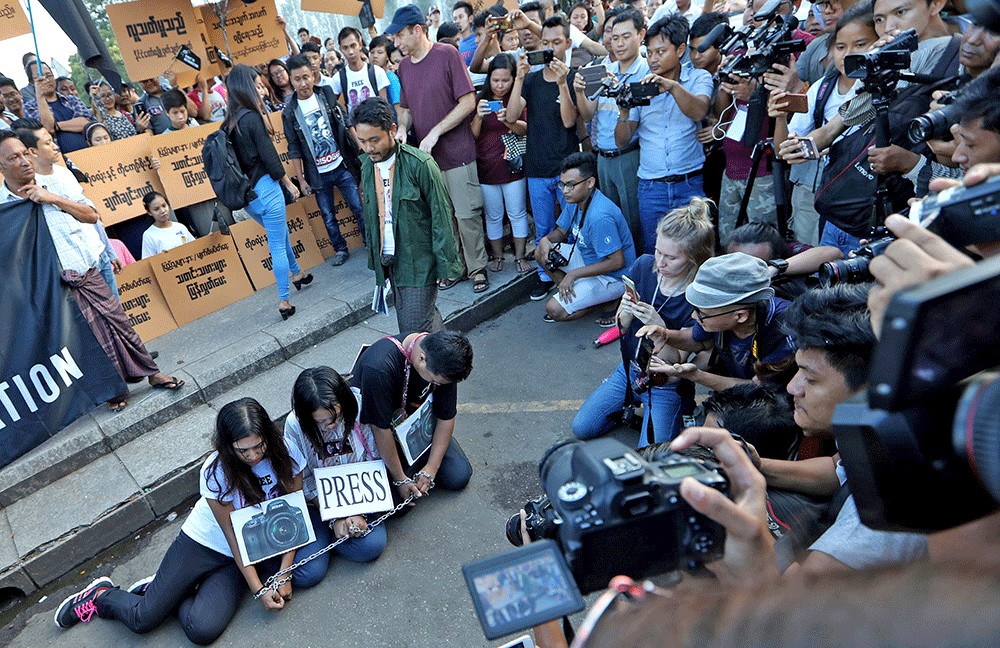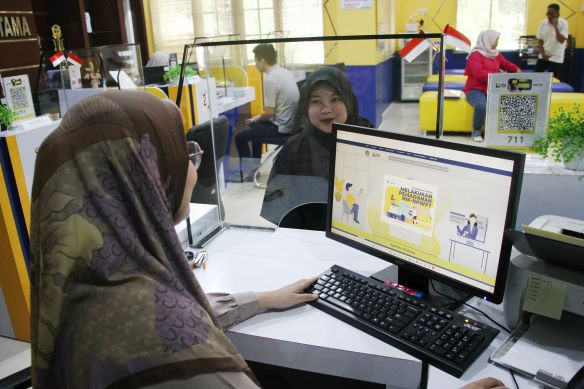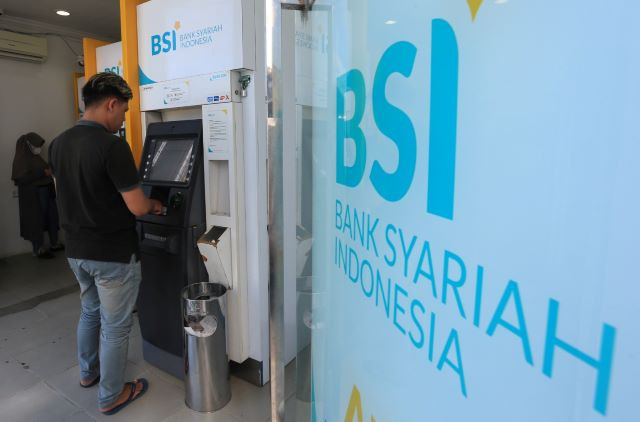Media gains reversed in Myanmar coup
Journalists have been arrested on vague and unclear grounds.
Change Size
 Solidarity: Myanmar press freedom advocates and youth activists hold a demonstration demanding the freedom of two imprisoned Reuters journalists, Wa Lone and Kyaw Soe Oo, in Yangon on Sunday. (Reuters/Ann Wang)
Solidarity: Myanmar press freedom advocates and youth activists hold a demonstration demanding the freedom of two imprisoned Reuters journalists, Wa Lone and Kyaw Soe Oo, in Yangon on Sunday. (Reuters/Ann Wang)
M
yanmar’s rise in the World Press Freedom Index ranking by 20 places from 151 in 2013 to 131 in 2017 – despite rules stacked against the media by a legal framework that permits significant government regulation – has reversed. This year in 2021, its ranking has tumbled back to 140.
Since the Feb. 1 military coup, recent press freedoms have been unceremoniously reversed. Journalism itself has been attacked and criminalized, with reporters arrested and detained for doing their jobs, and media outlets shut down and raided on specious grounds. Regular internet closures and the shutdown of news sites have escalated into widespread targeting of independent media as an institution and journalism as a profession.
This marks the latest move in the military’s long standing tactics to control and constrain public discourse in the country, and a tactical shift from targeted, content-based censorship to broad regulation and dismantling of the country’s independent media infrastructure.
These draconian measures harken back in time to Myanmar’s previous military dictatorship, which started in 1962 and lasted half a century. During that period, the military controlled all open public discourse. The ruling junta enjoyed a stranglehold on all formal political dialogue through state run media and a tight control on information exchange in and out of the country.
To be sure, even as Myanmar tentatively opened up during its transition to semi-democracy, media and other freedoms never had full protection. The military rigged the country’s constitution to give it the continuing ability to limit civil liberties and maintain leverage against the elected civilian government of Aung Suu Kyi and her National League for Democracy.
It was able to do so because the constitution allocated 25 percent of all parliament seats for the military, which also maintained control over the country’s mining, oil and gas industries, ensuring the military’s financial independence.
Advances in digital access and international discourse during the semi-democratic period meant the Myanmar military needed to adapt its game. Having lost its monopoly on the traffic of information, it used the country’s newfound access to relatively open information exchange as a new propaganda avenue, using bots to spread fake news fueling Islamophobic hate on social media.
Over the past few years, an uptick in targeting of journalists and other critics – including most notably the 2017 arrest of Reuters journalists Wa Lone and Kyaw Soe Oo for covering military atrocities against the Rohingya – further exposed the country’s fragile state of press freedom at the hands of the military.
After this year’s coup, content control of contraband topics escalated to widespread control of entire subjects and of the independent media infrastructure. Five media outlets – Mizzima, Myanmar Now, Khit Thit News, 7 Day News, and Democratic Voice of Burma – were shuttered and their offices raided for covering the civil disobedience movement and associated protests. All non-state owned daily papers have ceased publishing new content, and the industry as a whole is under severe pressure with some outlets being sued over their coverage.
Journalists have been arrested on vague and unclear grounds. Some were charged under Section 505 (a) of the Penal Code, which criminalizes comments that "cause fear, [and] spread false news [or] agitate … directly or indirectly a criminal offence against a government employee", or Section 505(b) for speech “likely to cause fear or alarm in the public.” These broad charges are easily deployable against any offense deemed to insult the Myanmar military, and carry a jail term of up to three years.
As of late April, at least 77 journalists have been arrested, 43 of which remained in custody. Making matters worse, it is difficult for the public – whether watchdogs, nonpartisan observers, or other reporters – to track where journalists are detained, and due to information delays, monitoring groups may not become aware of incidents for some time.
In a flashback to its tactics in the previous military era, the current junta is attempting to replace the void left by the persecuted media with its own narrative through controlled channels. In addition to local military-affiliated media establishments, the military hired Canadian-Israeli lobbyist Ari Ben-Menashe to frame its side of the story in the international media.
Ben-Menashe’s firm secured an exclusive placement for an international news crew to cover conditions in the country, who were allowed in to observe a highly curated perspective. The international media crew was taken with heavy military escorts to sites evidencing alleged violence by civil disobedience movement protesters. Subsequent reports by journalists on this tour reveal that the witnesses they were given access to supplied flimsy, internally inconsistent testimony.
What we are witnessing is the Myanmar military’s endgame. In this play, they have abruptly and unilaterally declared the country’s decade long experiment in a semi-open society with limited but notable media freedoms a failure, and reverted to an earlier era of total information control. The independent press of Myanmar is the principal victim.
***
James Gomez is regional director of Asia Centre – a not-for-profit organization working to create human rights impact in the region. Khin Mai Aung, born in Yangon, is on Asia Centre's advisory board and has practiced American civil rights, immigrant rights, and education law for more than 20 years.









